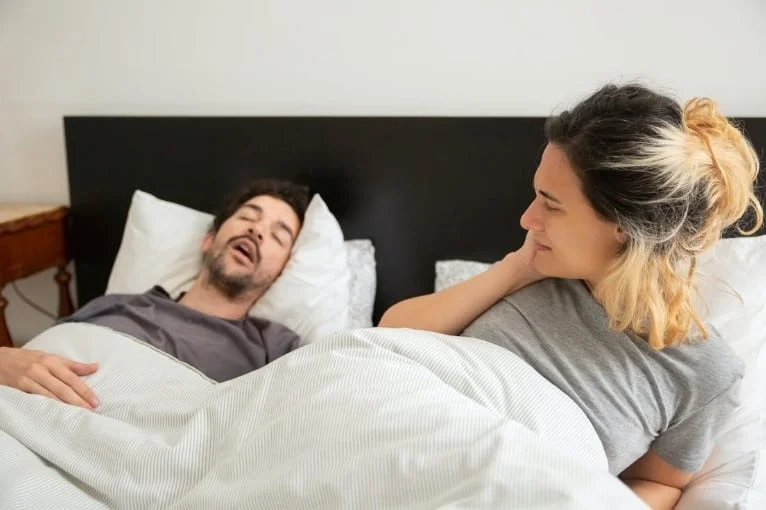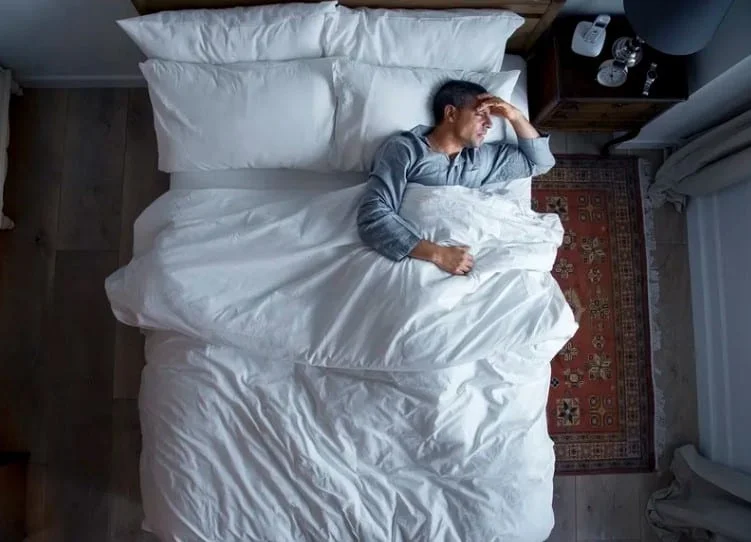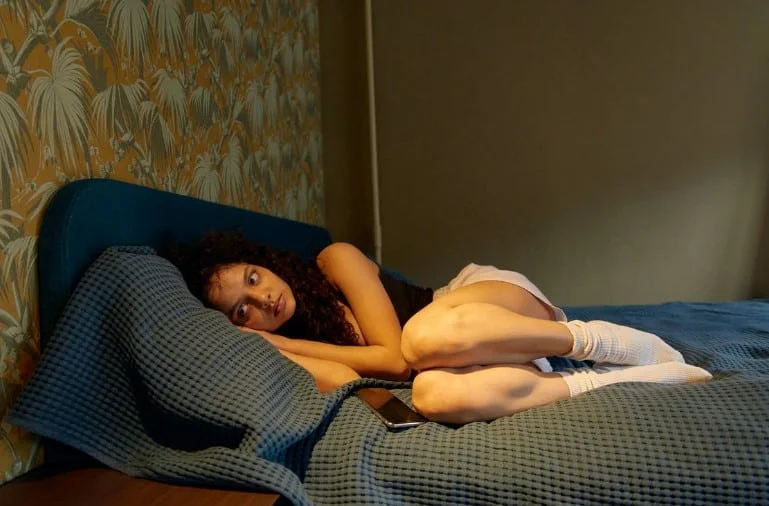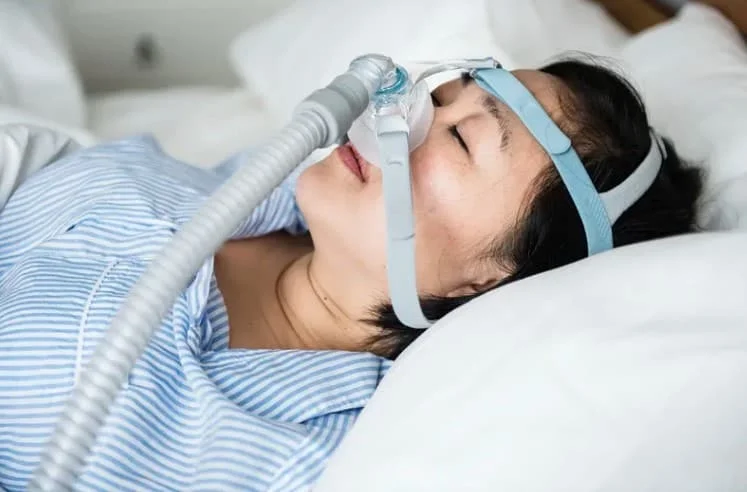Anxiety symptoms aren’t only psychological; many signs and symptoms of anxiety are physical and may worsen at night when you sleep.
People with anxiety may experience insomnia (or frequent nighttime awakening), disturbed sleep or restlessness at night, and morning headaches. Other common symptoms include frequent urination at night, excessive night sweats, and rapid heart rate.
Anxiety can interrupt your night’s sleep; the same is true for sleep apnea. However, can anxiety cause sleep apnea? Indeed, many anxiety symptoms are similar to what you’ll experience if you have obstructive, central, or complex sleep apnea, but are you at risk of developing apnea if you have anxiety?
Keep reading to learn if there’s an actual connection between anxiety and sleep apnea.
What Is Sleep Apnea?
Do you snore or find yourself gasping for air when you sleep? You might be experiencing sleep apnea.
Sleep apnea is a sleeping disorder that causes the individual to have interrupted sleep, preventing deep, restful sleep. Usually, the condition causes breathing to repeatedly stop and start during sleep, and the sufferer experiences a choking or gasping sensation as the body tries to resume breathing.
Sleep apnea can negatively impact your physical and mental health if left untreated. The condition might lead to complications, such as high blood pressure, daytime fatigue, liver problems, and metabolic syndrome.
Sleep apnea, particularly when accompanied by loud snoring, may annoy your sleeping partner and eventually create cracks in your relationship.
Types of Sleep Apnea
Sleep apnea can be obstructive, central, or complex. Here’s how these present:
- Obstructive sleep apnea: This is a common type of sleep apnea caused by an obstruction in the airway. The blockage occurs when the throat muscles relax and get in the way of taking in enough air while you sleep. Obstructive sleep apnea often results in gasping, choking, or snoring, which are ways your brain tries to wake you when it senses that you are not breathing.
- Central sleep apnea: This happens when your brain “forgets” to make you take in air while you sleep. You might not snort because your airway is not obstructed, but your breathing muscles don’t make any effort to breathe since they don’t receive any signal from your brain. If you experience central sleep apnea, you’ll likely wake up with shortness of breath.
- Complex sleep apnea: This refers to a condition where the sufferer experiences a combination of obstructive and central sleep apnea.
Symptoms of Sleep Apnea
Regardless of the type of sleep apnea you have, some of the common symptoms include:
- Loud snoring
- Fatigue or sleepiness during daytime
- Choking or gasping for air while asleep (usually accompanied by jerking movements)
- Awakening with shortness of breath
- Morning headache
- Night sweats
- Irritability or difficulty concentrating
- Hypersomnia (experiencing extreme sleepiness during daytime)
- Insomnia (having trouble staying asleep at night)
- Dry mouth right after waking up
- Depression or anxiety
Who Is at Risk of Developing Sleep Apnea?
Anyone can have sleep apnea, including adults and children. However, the risk of developing the problem is higher if:
- You are overweight or obese
- Someone in your family has sleep apnea
- You are male (research shows that men experience obstructive sleep apnea more than women)
- You have a chronic medical condition, such as type 2 diabetes, high blood pressure, and heart failure
- You are an older adult
- You smoke or use tranquilizers, sedatives, or alcohol
Anxiety and Sleep Apnea: What’s the Connection?

Understanding the link between anxiety and sleep apnea is important to properly answer the question, “Can anxiety cause sleep apnea?” For this reason, I’ve briefly summarized the connection between the two below.
Effects of Increased Anxiety
You probably already know that stress is an unavoidable part of life, especially in the modern world where we are constantly striving to accomplish multiple goals.
The good news is that your body is highly intelligent and will naturally deal with or cope with stress using anxiety. Your body triggers apprehension once it senses a fearful situation, putting you on high alert or readiness to handle whatever is coming.
Your body activates its fight-or-flight response when there is a stressful or threatening situation, whether it is real or perceived. This is an automatic psychological response to keep you safe.
While this automatic defense or preservation mechanism is great, consistently activating your fight-or-flight response can have negative consequences over time.
Overwhelming stress and uncontrolled anxiety can make relaxing difficult, cause poor sleep quality, and negatively impact your day-to-day function.
How Sleep Apnea Impacts Anxiety
If you already have anxiety, sleep apnea can worsen the condition.
Here’s how.
Sleep apnea makes it almost impossible for you to reach the deep sleep stage because you’ll spend a large part of the night abruptly waking up from sleep due to a lack of oxygen to the body. Even if you reach the deep sleep phase, you’ll likely be interrupted before you get any of the therapeutic benefits of sleep during the deep sleep phase.
Brain waves slow down during the deep sleep stage, and any damaged tissues in the body are repaired during this sleep phase. During this stage, your body stores the energy it needs to keep you functioning optimally throughout the next day, as well as boost your immune system.
Unfortunately, frequent sleep interruption (as is the case with sleep apnea) messes with the brain, preventing its waves from slowing down and interfering with the body’s tissue repair process.
Failing to reach the deep sleep stage is the same as experiencing sleep deprivation. In other words, you might spend 7 to 9 hours in bed without feeling rested and refreshed the next day because you didn’t quite get restorative sleep.
This means your body’s ability to recover is not up to par, which can affect your heart health and lead to blood pressure problems.
Also, your brain neurochemicals will likely be affected if you frequently experience interrupted deep sleep stages, which can alter your mood, cognitive function, and ability to deal with stress positively.
Bottom line: a poor night’s sleep (whether due to sleep apnea or anxiety) can exacerbate anxiety and make it difficult to fall asleep or enjoy restful sleep, leading to a poor sleep pattern.
Can Anxiety Cause Sleep Apnea?

Anxiety is one of the many symptoms of sleep apnea, but there is no conclusive evidence to show that anxiety leads to sleep apnea.
Sleep apnea tends to worsen anxiety since apnea episodes prevent restful sleep phases, increasing anxiety symptoms. While these problems are somewhat linked, having anxiety doesn’t necessarily mean you are at risk of developing sleep apnea.
This is good news if you experience increased anxiety in the morning or at night.
However, if you already have sleep apnea, you should consider finding a lasting solution to anxiety issues. This is because anxiety tends to be more prevalent among many people with sleep apnea (I’ll cover more on that in a bit).
Anxiety may not cause sleep apnea, but it can interfere with medical or therapeutic sleep apnea treatment, making your efforts at reducing or eliminating the problem less effective.
Sleep apnea stops you from reaching the deep phases of sleep, leading to sleep debt. This is especially true if you frequently experience several apnea episodes in one night.
If inadequate or poor sleep becomes a pattern, your brain will have a tough time coping with the stress on your mind and body. This may lead to severe problems, including increased anxiety (if you already have it) and high blood pressure.
Consistently lacking restful sleep may trigger panic attacks at night. It gets worse if you have anxiety and suddenly wake up gasping for air because your brain detects that you’re not breathing and transmits signals to the muscles responsible for breathing.
In a nutshell, anxiety is unlikely to cause sleep apnea. However, if you have sleep apnea, you should take steps to prevent or reduce anxiety-triggering thoughts and activities.
Why Is Anxiety Higher in People With Sleep Apnea?

Although anxiety is unlikely to cause sleep apnea, research suggests a much higher occurrence of obstructive sleep apnea in people with anxiety than in the general population.
Why is this so?
Sleep apnea interrupts restful sleep and may even prevent you from going back to sleep after repeated episodes. In some cases, apnea can cause nighttime panic attacks, especially when the sufferer jerks awake in an attempt to breathe.
Apnea might lead to sleep debt if the episodes occur too frequently in one night. In addition to sleep, sleep apnea may increase the risk of other health problems.
Here’s what happens when you stop breathing due to sleep apnea:
- Low heart rate: Your heart rate starts to slow down when you stop breathing because there is no supply of oxygen to your body.
- Involuntary reflexes kick in: Your nervous system senses that your body is deprived of oxygen and tries to wake you up by rousing or startling you.
- High rate accelerates quickly: Once you respond to the involuntary reflexes and become awake, you gasp for air, and your heart rate increases rapidly.
- Increased blood pressure: When this process happens repeatedly, your blood pressure tends to rise.
People who experience frequent apnea are at increased risk of developing severe health issues like heart problems.
If your heart walls constantly go through the cycle of thickening to cope with the extra work required when you suddenly jerk awake to draw in more air, the process will eventually alter the structure of your heart.
Over time and with continuous heart wall thickening, your heart will have more fibrous cells, causing it to become less flexible and stiffer. And as you already figured, this can lead to heart problems, such as atrial fibrillation (A-fib).
The risk of developing a heart problem is particularly likely if you stop breathing as many as 30 times or more within an hour (although you may develop heart issues even when apnea occurs at a lower frequency rate).
All of these are more than enough to worsen existing anxiety issues and cause more physical and mental problems if not treated.
Treating Anxiety and Sleep Apnea

From the preceding discussion, it is clear that sleep apnea can aggravate anxiety. However, treating anxiety and sleep apnea is still important, even though the former may not necessarily cause the latter.
The fact is that both problems have a bidirectional relationship, meaning one often affects the other.
If you have sleep apnea, consider treating it alongside anxiety. Lacking sleep due to apnea can result in anxiety, so it is best to treat both together. Once your sleep apnea improves, you’ll start sleeping better and experience fewer anxiety symptoms.
I suggest speaking with your doctor as quickly as possible if you have anxiety, sleep apnea, or both. Your doctor will recommend the best treatment for you after proper diagnosis.
By the way, it is crucial to avoid self-diagnosis. You don’t necessarily have anxiety or sleep apnea just because you suddenly wake up in the middle of the night. Besides, sleep apnea is not easily diagnosed at home.
Once your healthcare provider confirms that you have sleep apnea, they’ll recommend conservative treatments, mechanical therapy, or surgery, depending on your specific condition.
A conservative apnea treatment usually yields positive results for people with mild apnea cases. On the other hand, you might need to undergo mechanical therapy in some mild to moderate cases. This can include the use of continuous positive airway pressure (CPAP) device to prevent the airways from closing while you sleep and improve breathing.
Surgery procedures might be recommended for complex sleep apnea cases, where the patient doesn’t snore but experience apnea episodes.
Conclusion
Can anxiety cause sleep apnea? Most recent studies suggest that anxiety is hardly a risk factor for sleep apnea. However, sleep apnea can worsen anxiety problems because apnea episodes often lead to sleep debt.
While an anxiety disorder may not cause sleep apnea, it is usually a good idea to treat both conditions simultaneously if you have sleep apnea. Remember that both problems are somewhat connected, so improving one condition will likely alleviate the other.




![7 Best Apps To Improve Self-Esteem : [How to Make 2023 Amazing] 9 7 Best Apps To Improve Self-Esteem [2022]](https://thinkpositivecheck.com/wp-content/uploads/2022/02/7-Best-Apps-To-Improve-Self-Esteem-2022-1024x576.png)